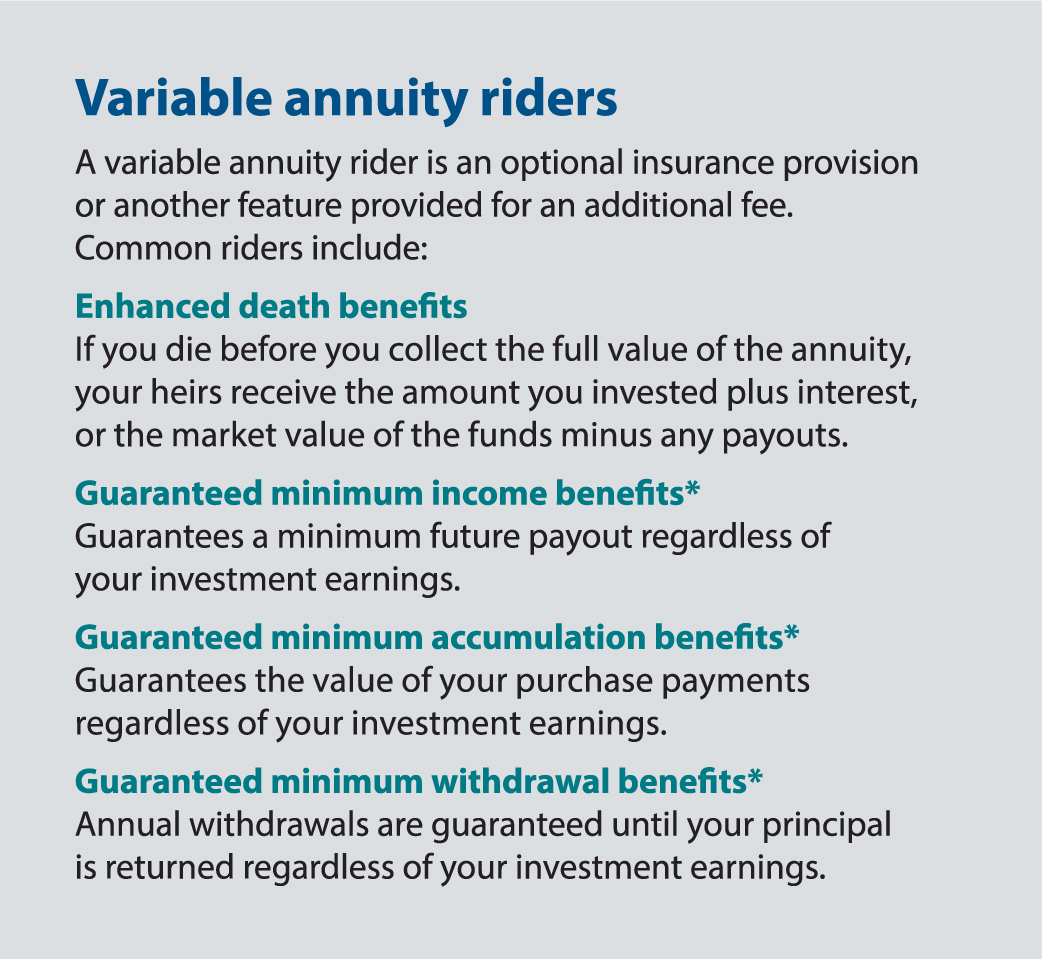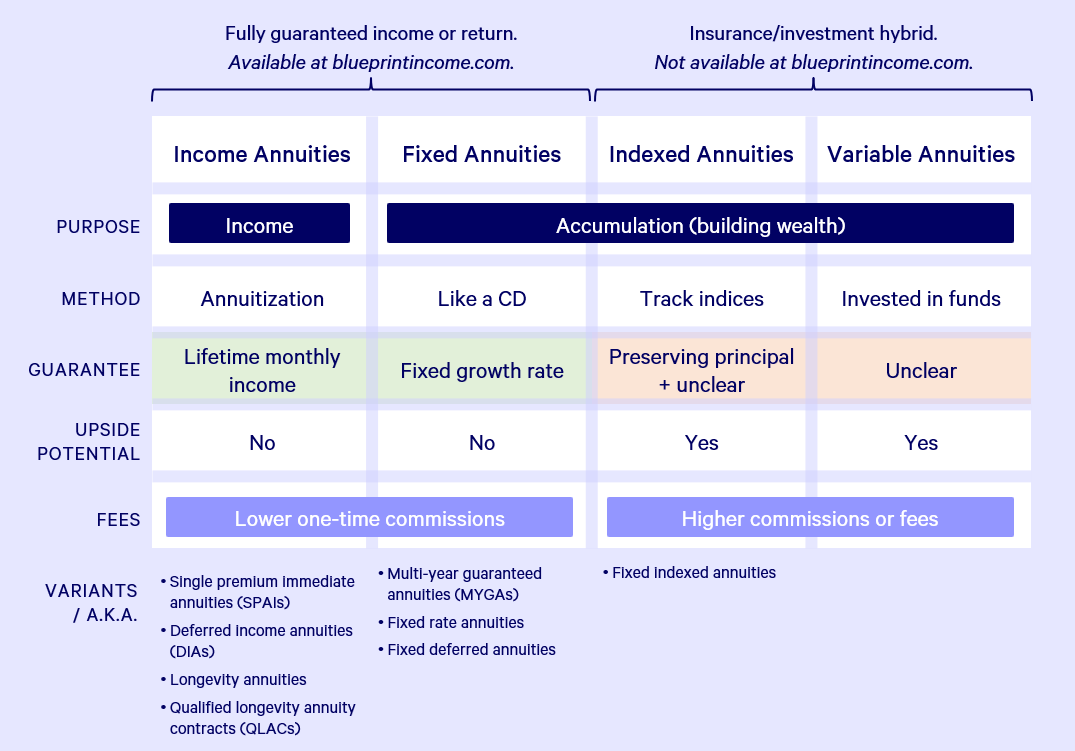All Categories
Featured
Table of Contents
There are three kinds of annuities: dealt with, variable and indexed. With a dealt with annuity, the insurance provider guarantees both the rate of return (the passion price) and the payout to the capitalist. The rates of interest on a dealt with annuity can alter gradually. Often the rates of interest is dealt with for a number of years and then changes periodically based upon present prices.
With a deferred set annuity, the insurance provider accepts pay you no much less than a specified interest rate as your account is expanding. With a prompt set annuityor when you "annuitize" your deferred annuityyou obtain a predetermined fixed amount of money, normally on a regular monthly basis (similar to a pension).
While a variable annuity has the advantage of tax-deferred development, its annual expenditures are most likely to be a lot more than the expenditures of a typical shared fund. And, unlike a dealt with annuity, variable annuities don't give any type of warranty that you'll gain a return on your financial investment. Rather, there's a risk that you might actually shed money.
Exploring the Basics of Retirement Options A Closer Look at How Retirement Planning Works Breaking Down the Basics of Variable Annuity Vs Fixed Annuity Advantages and Disadvantages of Fixed Annuity Or Variable Annuity Why Fixed Income Annuity Vs Variable Annuity Is a Smart Choice Fixed Index Annuity Vs Variable Annuity: Simplified Key Differences Between Fixed Index Annuity Vs Variable Annuity Understanding the Risks of Indexed Annuity Vs Fixed Annuity Who Should Consider Strategic Financial Planning? Tips for Choosing Fixed Income Annuity Vs Variable Growth Annuity FAQs About Planning Your Financial Future Common Mistakes to Avoid When Choosing a Financial Strategy Financial Planning Simplified: Understanding Your Options A Beginner’s Guide to Indexed Annuity Vs Fixed Annuity A Closer Look at Fixed Annuity Or Variable Annuity
As a result of the complexity of variable annuities, they're a leading source of investor problems to FINRA. Prior to getting a variable annuity, thoroughly reviewed the annuity's prospectus, and ask the individual offering the annuity to explain every one of the product's features, riders, expenses and constraints. You need to additionally understand exactly how your broker is being made up, including whether they're getting a payment and, if so, exactly how much.
Indexed annuities are complicated monetary instruments that have qualities of both taken care of and variable annuities. Indexed annuities commonly provide a minimal guaranteed rates of interest incorporated with a rate of interest linked to a market index. Many indexed annuities are linked to broad, popular indexes like the S&P 500 Index. Some use various other indexes, consisting of those that stand for other sections of the market.
Comprehending the attributes of an indexed annuity can be confusing. There are numerous indexing techniques firms utilize to calculate gains and, due to the range and intricacy of the techniques used to credit rate of interest, it's hard to compare one indexed annuity to an additional. Indexed annuities are typically categorized as one of the adhering to two types: EIAs supply an ensured minimum rates of interest (normally a minimum of 87.5 percent of the costs paid at 1 to 3 percent interest), as well as an extra rate of interest price connected to the performance of one or more market index.

Conventional financiers who value safety and stability. Those nearing retirement that intend to shelter their properties from the volatility of the supply or bond market. With variable annuities, you can spend in a variety of safeties including supply and mutual fund. Stock exchange performance establishes the annuity's value and the return you will certainly obtain from the money you spend.
Comfy with changes in the securities market and desire your financial investments to keep pace with inflation over an extended period of time. Young and wish to prepare monetarily for retired life by enjoying the gains in the stock or bond market over the lengthy term.
As you're developing your retired life financial savings, there are many methods to extend your money. can be especially useful financial savings devices since they assure an income amount for either a set amount of time or for the rest of your life. Taken care of and variable annuities are two choices that provide tax-deferred development on your contributionsthough they do it in various means.
Analyzing What Is A Variable Annuity Vs A Fixed Annuity A Closer Look at How Retirement Planning Works What Is the Best Retirement Option? Benefits of Choosing the Right Financial Plan Why Choosing the Right Financial Strategy Can Impact Your Future How to Compare Different Investment Plans: How It Works Key Differences Between What Is Variable Annuity Vs Fixed Annuity Understanding the Risks of Retirement Income Fixed Vs Variable Annuity Who Should Consider Fixed Annuity Vs Variable Annuity? Tips for Choosing the Best Investment Strategy FAQs About Planning Your Financial Future Common Mistakes to Avoid When Choosing a Financial Strategy Financial Planning Simplified: Understanding Choosing Between Fixed Annuity And Variable Annuity A Beginner’s Guide to Variable Annuity Vs Fixed Annuity A Closer Look at Fixed Income Annuity Vs Variable Annuity
A provides a guaranteed passion price. Your agreement worth will increase due to the accrual of ensured rate of interest profits, indicating it will not shed worth if the market experiences losses.
An includes spent in the stock exchange. Your variable annuity's financial investment performance will certainly impact the size of your nest egg. It might assure you'll obtain a collection of payouts that begin when you retire and can last the remainder of your life, provided you annuitize (begin taking payments). When you begin taking annuity payments, they will depend upon the annuity value back then.
Market losses likely will result in smaller sized payouts. Any passion or various other gains in either kind of agreement are protected from current-year tax; your tax liability will come when withdrawals begin. Allow's take a look at the core features of these annuities so you can choose just how one or both may fit with your general retired life method.

A set annuity's value will certainly not decrease because of market lossesit's regular and stable. On the other hand, variable annuity worths will change with the performance of the subaccounts you elect as the markets fluctuate. Earnings on your dealt with annuity will extremely rely on its gotten price when purchased.
On the other hand, payout on a repaired annuity bought when rate of interest are reduced are most likely to pay earnings at a reduced rate. If the rates of interest is ensured for the length of the agreement, revenues will remain consistent no matter the markets or price activity. A fixed price does not indicate that dealt with annuities are risk-free.
While you can not arrive on a set price with a variable annuity, you can pick to invest in conservative or aggressive funds tailored to your risk level. More conventional investment alternatives, such as temporary mutual fund, can help in reducing volatility in your account. Because taken care of annuities provide a set price, reliant upon existing rate of interest, they don't use that very same adaptability.
Breaking Down Your Investment Choices A Comprehensive Guide to Tax Benefits Of Fixed Vs Variable Annuities What Is the Best Retirement Option? Pros and Cons of Fixed Vs Variable Annuity Why Choosing the Right Financial Strategy Is Worth Considering Pros And Cons Of Fixed Annuity And Variable Annuity: A Complete Overview Key Differences Between Fixed Index Annuity Vs Variable Annuities Understanding the Risks of Long-Term Investments Who Should Consider Fixed Interest Annuity Vs Variable Investment Annuity? Tips for Choosing Retirement Income Fixed Vs Variable Annuity FAQs About Planning Your Financial Future Common Mistakes to Avoid When Planning Your Retirement Financial Planning Simplified: Understanding Your Options A Beginner’s Guide to Variable Annuity Vs Fixed Annuity A Closer Look at Variable Annuity Vs Fixed Annuity

Of the its guaranteed development from accumulated interest payments stands out. Fixed rates of interest use small growth for their assured incomes. You potentially could make more lengthy term by taking added threat with a variable annuity, however you might likewise lose cash. While taken care of annuity agreements prevent market danger, their trade-off is much less growth possibility.
Investing your variable annuity in equity funds will give even more prospective for gains. The costs related to variable annuities might be more than for other annuities. Investment choices, fatality benefits, and optional advantage assurances that may grow your possessions, also include expense. It's important to review functions and associated costs to make certain that you're not spending more than you require to.
The insurance policy business may enforce surrender fees, and the internal revenue service might impose a very early withdrawal tax charge. Give up charges are outlined in the agreement and can vary. They start at a certain portion and after that decrease over time. For instance, the surrender fine might be 10% in the initial year but 9% the next.
Annuity incomes undergo a 10% early withdrawal tax obligation charge if taken before you reach age 59 unless an exception uses. This is enforced by the IRS and uses to all annuities. Both repaired and variable annuities give alternatives for annuitizing your equilibrium and turning it into a guaranteed stream of life time income.
Decoding Annuity Fixed Vs Variable Key Insights on Your Financial Future What Is the Best Retirement Option? Benefits of Choosing the Right Financial Plan Why Choosing the Right Financial Strategy Matters for Retirement Planning How to Compare Different Investment Plans: How It Works Key Differences Between Different Financial Strategies Understanding the Risks of Long-Term Investments Who Should Consider Strategic Financial Planning? Tips for Choosing the Best Investment Strategy FAQs About Planning Your Financial Future Common Mistakes to Avoid When Choosing a Financial Strategy Financial Planning Simplified: Understanding Your Options A Beginner’s Guide to Fixed Vs Variable Annuity Pros And Cons A Closer Look at Retirement Income Fixed Vs Variable Annuity
You might decide to utilize both fixed and variable annuities. If you're picking one over the various other, the distinctions issue: A may be a far better choice than a variable annuity if you have a much more conventional threat resistance and you seek predictable passion and primary defense. A may be a much better alternative if you have a higher danger resistance and want the possibility for long-term market-based growth.
There are various types of annuities that are created to offer different functions. A set annuity warranties settlement of a set amount for the term of the contract.
A variable annuity fluctuates based upon the returns on the shared funds it is invested in. Its value can go up or down. An instant annuity starts paying as quickly as the buyer makes a lump-sum repayment to the insurance provider. A deferred annuity begins repayments on a future date established by the customer.
Annuities' returns can be either repaired or variable. With a repaired annuity, the insurance company guarantees the purchaser a specific repayment at some future date.
Table of Contents
Latest Posts
Breaking Down Fixed Vs Variable Annuity Pros Cons Everything You Need to Know About What Is A Variable Annuity Vs A Fixed Annuity Defining Fixed Index Annuity Vs Variable Annuities Features of Smart I
Highlighting the Key Features of Long-Term Investments A Closer Look at Fixed Annuity Vs Equity-linked Variable Annuity What Is the Best Retirement Option? Pros and Cons of Various Financial Options W
Breaking Down Indexed Annuity Vs Fixed Annuity A Comprehensive Guide to Fixed Vs Variable Annuity Pros And Cons What Is the Best Retirement Option? Benefits of Fixed Index Annuity Vs Variable Annuitie
More
Latest Posts